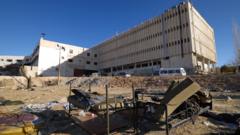---
Saydnaya prison looms ominously on a hill, a stark reminder of the dark past under Bashar al-Assad's regime. Recently repainted in the colors of Syria's revolutionary flag, the prison nonetheless retains its sinister aura. It has been estimated that over 30,000 detainees have perished within its walls since the onset of the Syrian war in 2011, contributing to a haunting count of more than 100,000 missing individuals, including countless innocent men, women, and children.
While other facilities in Assad's prison network permitted phone calls and family visits, Saydnaya operates as a chilling epicenter of fear. The regime instilled terror in its populace through intricate networks of intelligence agencies and systematic torture, with Saydnaya epitomizing the state's oppressive control.
The recent liberation of Saydnaya has unearthed desperate pleas for truth and justice as volunteers swarm to unearth the records left behind in chaos. Among their ranks, musician Safana Bakleh spearheads efforts to retrieve vital documentation. Amidst disarray, families search for any sign of their missing loved ones, with some hoping to find answers through potentially damning evidence.
“The truth is far worse than what we imagined,” reflects volunteer Widad Halabi, overcome by sorrow during her visit. The dismal conditions reveal a dark reality, where detainees had limited access to sanitation, with many resorting to plastic bags for basic needs.
With the Assad dynasty largely fled or in hiding, accountability for their actions seems daunting. Families visit Saydnaya to piece together fragments of their pasts—some have lived through the same traumas firsthand, while others endure a shared agony of loss. The memories of countless victims live on in these halls.
Calls for justice resonate among the grieving families. A group of men at Saydnaya express their determination to hold accountable everyone involved in its horrors. Ahmed, a survivor, dreams of his brother still imprisoned, asserting, “They must pay for their crimes.”
One of the prison's ex-detainees, Hassan Abu Shwarb, recalls his harrowing experiences and vows to continue advocating for retribution against those who inflicted pain on so many. He recounts the crippling debt incurred by desperate families to secure releases that were ultimately thwarted by rampant corruption.
Despite enduring extensive torture, he echoed a sentiment echoed by many: “They should be punished. We are human souls, not stones. Those who killed must face justice.” As Syria navigates the tumult of rebuilding, the need for accountability weighs heavily.
The recent transition towards a new leadership, with figures such as Ahmed al-Sharaa stepping out of the shadows of the past, indicates a need for an honest reckoning with the nation’s wrongdoings. Many recognize that to truly move on, the leaders of the fallen regime must answer for their atrocities.
As Syrians grapple with their fraught history, the quest for justice forms an essential piece in their efforts to forge a hopeful future. The overwhelming desire for truth underscores a collective yearning to heal and move forward in a country ready to reclaim its narrative from the depth of its suffering.
Saydnaya prison looms ominously on a hill, a stark reminder of the dark past under Bashar al-Assad's regime. Recently repainted in the colors of Syria's revolutionary flag, the prison nonetheless retains its sinister aura. It has been estimated that over 30,000 detainees have perished within its walls since the onset of the Syrian war in 2011, contributing to a haunting count of more than 100,000 missing individuals, including countless innocent men, women, and children.
While other facilities in Assad's prison network permitted phone calls and family visits, Saydnaya operates as a chilling epicenter of fear. The regime instilled terror in its populace through intricate networks of intelligence agencies and systematic torture, with Saydnaya epitomizing the state's oppressive control.
The recent liberation of Saydnaya has unearthed desperate pleas for truth and justice as volunteers swarm to unearth the records left behind in chaos. Among their ranks, musician Safana Bakleh spearheads efforts to retrieve vital documentation. Amidst disarray, families search for any sign of their missing loved ones, with some hoping to find answers through potentially damning evidence.
“The truth is far worse than what we imagined,” reflects volunteer Widad Halabi, overcome by sorrow during her visit. The dismal conditions reveal a dark reality, where detainees had limited access to sanitation, with many resorting to plastic bags for basic needs.
With the Assad dynasty largely fled or in hiding, accountability for their actions seems daunting. Families visit Saydnaya to piece together fragments of their pasts—some have lived through the same traumas firsthand, while others endure a shared agony of loss. The memories of countless victims live on in these halls.
Calls for justice resonate among the grieving families. A group of men at Saydnaya express their determination to hold accountable everyone involved in its horrors. Ahmed, a survivor, dreams of his brother still imprisoned, asserting, “They must pay for their crimes.”
One of the prison's ex-detainees, Hassan Abu Shwarb, recalls his harrowing experiences and vows to continue advocating for retribution against those who inflicted pain on so many. He recounts the crippling debt incurred by desperate families to secure releases that were ultimately thwarted by rampant corruption.
Despite enduring extensive torture, he echoed a sentiment echoed by many: “They should be punished. We are human souls, not stones. Those who killed must face justice.” As Syria navigates the tumult of rebuilding, the need for accountability weighs heavily.
The recent transition towards a new leadership, with figures such as Ahmed al-Sharaa stepping out of the shadows of the past, indicates a need for an honest reckoning with the nation’s wrongdoings. Many recognize that to truly move on, the leaders of the fallen regime must answer for their atrocities.
As Syrians grapple with their fraught history, the quest for justice forms an essential piece in their efforts to forge a hopeful future. The overwhelming desire for truth underscores a collective yearning to heal and move forward in a country ready to reclaim its narrative from the depth of its suffering.

















